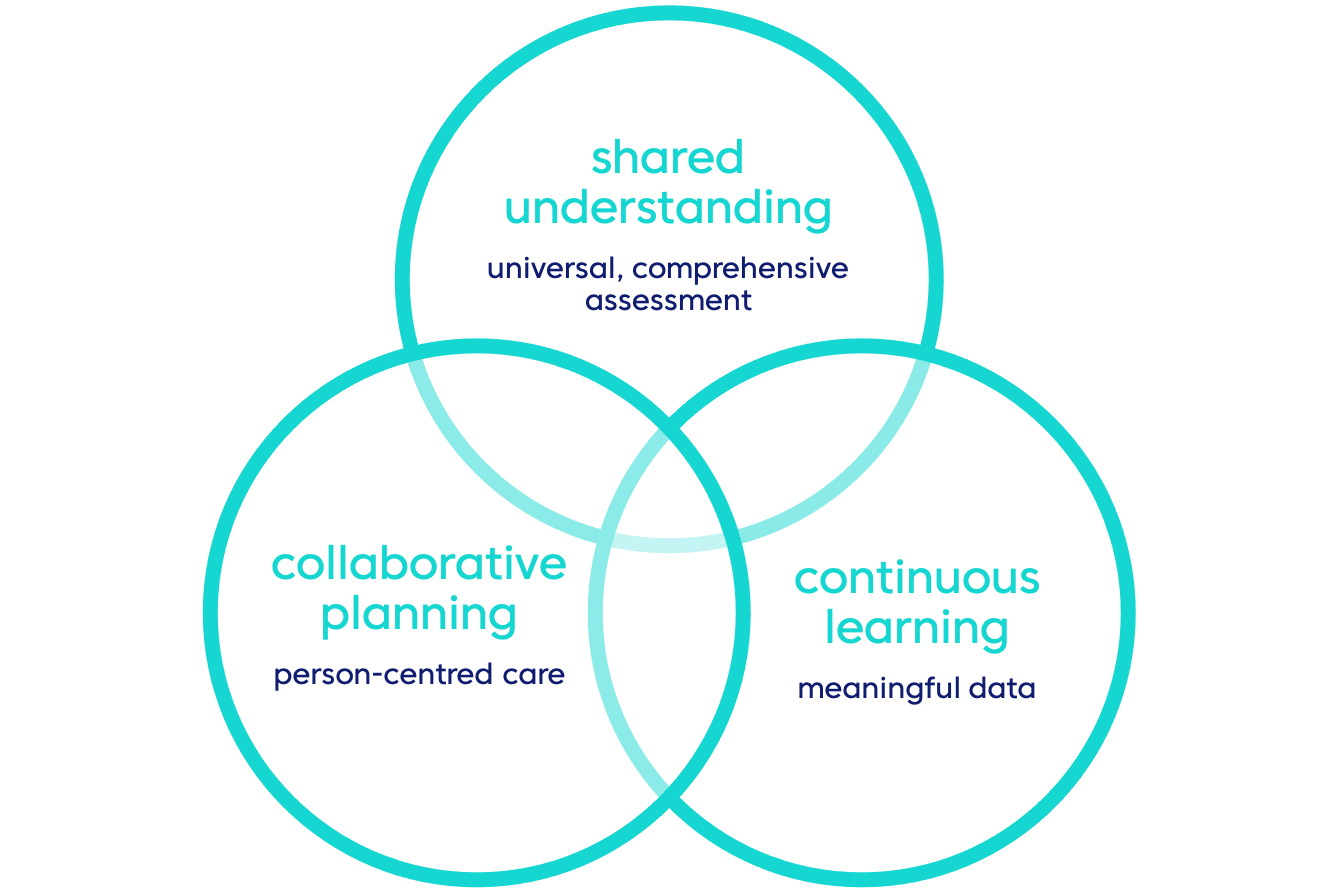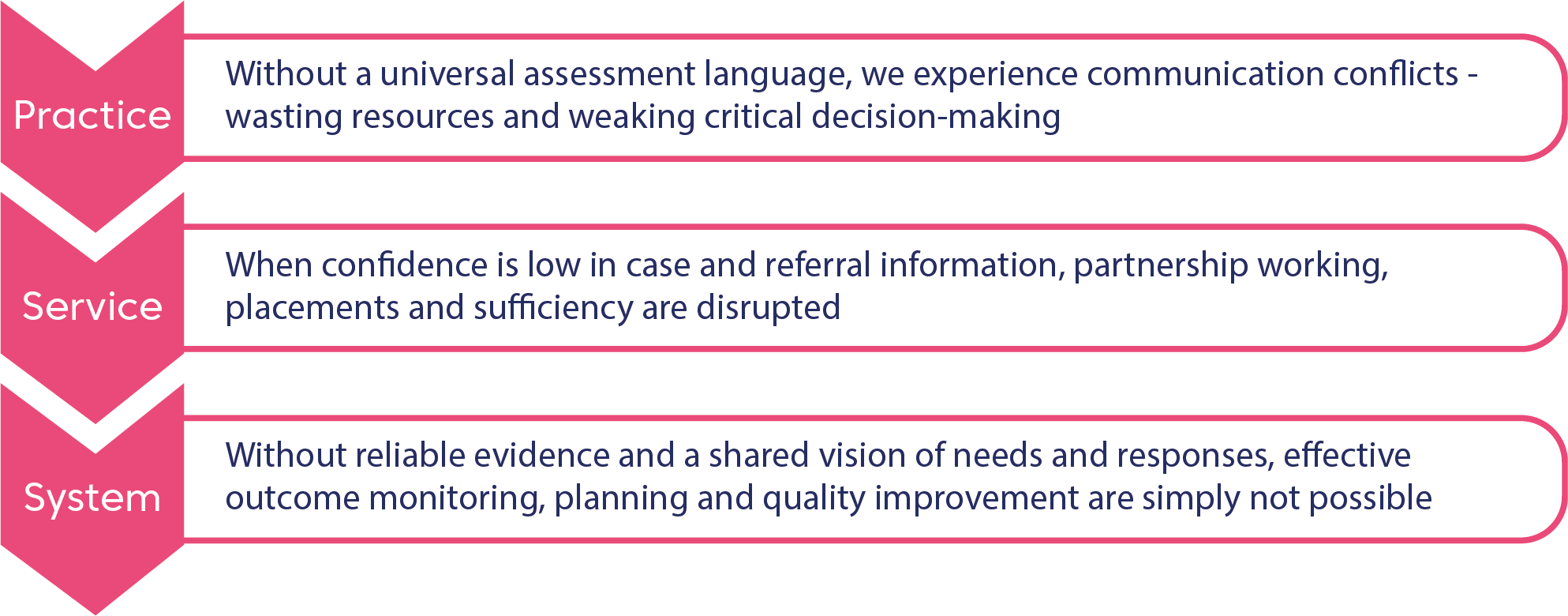Why is a universal assessment strategy the missing link in children’s social care?
Care is complex. Resources are pressurised. Decisions are hard to make, and evidence to support them is lacking.
To improve lives, we must unite with a shared vision of needs, service responses and outcomes. So, what are we doing about it?
Reliably assessing and communicating needs and strengths - to inform service responses and enable meaningful monitoring of outcomes - is a continuous challenge and one shared by all local authorities, providers and practitioners.
Children and families need to be involved and understood in conversations and decisions about their care, and confident that clear information about their individual circumstances, needs and strengths is acknowledged by the whole system supporting them.
Providers need confidence in referral information, a structured way to assess needs, strengths and outcomes in partnership with case workers and local authorities. They need a reliable means to provide transparency, demonstrate effectiveness of services, and access the insights that will help them ensure their services meet the needs of children, young people and families.
Commissioners and practitioners need confidence that complex care services are working together effectively and making confident decisions with a shared view of needs. They need a reliable way to monitor outcomes, measure the effectiveness of services, and make those critical financial decisions in the short and long term.
As a whole sector we need a long-term plan to better understand what works, when, where and for which children and families.
Assessment is our only meaningful source of data – but data’s only helpful if we know how to use it
For many years, it has been recognised that the enhanced use and sharing of reliable assessment data is critical to improving outcomes in children’s social care – as emphasised in the DfE’s Putting Children First white paper of 2016.
When it comes to evidencing and understanding the outcomes of care, England is far behind internationally. A universal assessment approach, providing consistent, valid and reliable national data, is fundamental to fixing this problem.
“The relentless pursuit of excellent practice across the system will depend on high quality data being shared and used. At a national level, data should inform policy and legislation about children’s social care; help us target support and challenge to local areas; and facilitate local learning. At a local level, data can ensure that the need for help is identified early; resources are targeted appropriately; services are commissioned effectively and efficiently; risk is managed well; and the right support is put in place for children and their families.”
“Too often, data are used primarily to try to indicate good or bad performance at specific intervals, rather than to identify opportunities to improve outcomes for children on an ongoing basis. Leaders and practitioners report that the way we share data does not always meet their needs and that local authorities can lack the tools, and capacity to fully utilise data to improve practice and outcomes for children.”
‘Using good data to improve practice’ Putting Children First: Delivering our vision for excellent children’s social care, Department for Education, July 2016
Finding a sustainable and transformational solution
In 2016, The Centre for Outcomes of Care (OOC), led by Dr. Mark Kerr, began an extensive review of potential solutions to the assessment and outcome management challenge in children’s social care in England, responding to the needs of councils, providers and service users.
OOC’s review concluded that an internationally established solution was already in existence, representing a missed opportunity for social care in England.
Originally developed in the United States and widely used internationally, Transformational Collaborative Outcomes Management (TCOM) is a collaborative approach to assessment and outcome management designed to improve the role of assessment in care planning, outcome monitoring and service development.
As early as 2015, TCOM’s primary assessment tool, the Child & Adolescent Needs and Strengths (CANS) assessment had already been identified by the Department for Education as one of the more sophisticated approaches to assessing need in residential placement decision-making. The tool has been widely used since 2009 in practice and in research as a reliable, comprehensive measure of needs, risks, strengths and outcomes.
Having identified TCOM as the most appropriate, comprehensive assessment and outcome monitoring approach for local authorities and providers, OOC formed a collaboration of experts to adapt TCOM’s assessment tools for use in England. A number of local authorities and care providers are already implementing TCOM’s Child & Adolescent Needs & Strengths (CANS) assessment as a collaborative, comprehensive assessment and outcome monitoring tool to guide decision-making and planning.
The final piece of the puzzle – redefining the role of assessment software to enable evidence-based care
A key benefit of TCOM’s assessment tools is the comprehensive and reliable data provided through longitudinal assessment, bringing together the multiple perspectives that matter when analysing and understanding change and progress.
But data only helps if the insights it provides are accessible to decision-makers in care – as a support to professional judgement.
As people who care we need to understand and learn from outcomes relating to past care decisions and care journeys. What’s worked for particular needs profiles of children previously? These insights should inform future decisions. Technology has evolved to support decision-making in this way in many aspects of life, but social care in England has so far been slow to harness the possibilities.
With TCOM’s universal assessment strategy now available to organisations in England, it’s time to harness the possibilities of data-informed decision-making.
In the US, TCOM and the CANS family of assessment tools have been in place for many years along with technology that maximises the unique insights CANS data provides. As well as being able to introduce the CANS assessments as part of TCOM England, we have also been able to identify advanced software platforms.
There are anxieties about giving technology a critical role in a sector where professional judgment will always be key. Standard artificial intelligence (AI) or machine learning can simply encourage us to repeat decision-making patterns and entrench biases, rather than empowering us with insights to support positive change. This was a key consideration when seeking a technology solution for CANS data.
After an extensive review of the options, OOC identified a software application called P-CIS (Person-Centred Intelligence Solution), to transform longitudinal assessment data into meaningful insights that support decision-making in real time – as a constant companion in management and practice.
Developed in synergy with the TCOM assessment approach, P-CIS redefines the role of assessment software to enable collaboration and make evidence-based decision-making a day-to-day reality for every person involved in the care journey:
Dr. Kate Cordell is chief executive, chief scientific officer and co-founder of Opeeka, now a lead partner in the TCOM England initiative and supporting implementation of the CANS assessment tool in England.
“I’ve always been particularly interested in improving the way data can tell individual and population stories but also enable critical learning about what works for whom. This means turning complex data into something that’s accessible daily and meaningful within the busy work of care, not just in hindsight or through costly research projects.
“As an online assessment software, P-CIS transforms all sources of assessment data into useful information about a person’s story and their changes within services. These insights are then accessible in real-time to inform care-planning and decision-making in practice. As an outcomes analysis tool that supports commissioning and management of services, P-CIS learns from and illustrates an agency’s population needs, practitioner successes and crucially, the drivers of positive outcomes.
“Person-Centred Intelligence is very different to standard machine learning or standard artificial intelligence. It learns the drivers of positive outcomes and offers insights that enable professional judgment, rather than restricting it. This process reinforces good care decisions, reducing and preventing individual or institutional bias.”
Dr Kate Cordell, Co-Founder of Opeeka and P-CIS assessment software
By combining the reliability of the CANS scores with the analytical power of P-CIS, we can really empower professionals on a daily basis to support their professional judgement with meaningful insights from reliable evidence. We can increase our chances of making the right decisions in critical stages of care planning, such as placements and step-down.
Let’s say Katie comes in to care with very little information but is demonstrating challenging behaviours. The team are unsure what placement will work for Katie. Using P-CIS the results of Katie’s CANS are compared with the assessments and care journeys of thousands of other children to identify similar profiles. Once similar cases are identified, the team is provided with reliable information on what type of placement or interventions worked (and what didn’t work) in improving outcomes for those children. Armed with this information the team can the make a more informed decision on where to place Katie. Such analysis takes seconds, online and in real-time.
It’s time to start learning together
TCOM England is a collaborative initiative providing internationally established assessment, outcome monitoring and decision-support tools for local authorities and care providers in England.
To find out more or discuss implementing the TCOM England assessment strategy within your organisation, please contact us to arrange a conversation.





